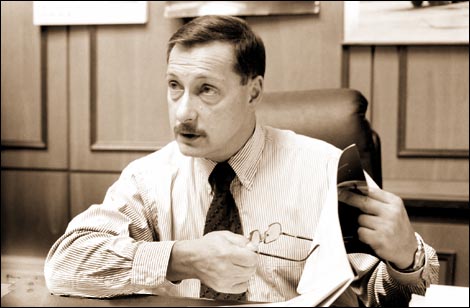| 
Question: Russia does not have a strategic enemy across
the ocean. No enemy means peace, right? Are the military reforms in
Russia preparations for peace?
Arbatov:
Any changes in the structure of the Armed Forces are, first and foremost,
preparations for a war. These preparations prevent aggression.
The threat of aggression against Russia by foreign countries does not exist
these days. There is, however, a possibility of conflicts between foreign
countries that Russia may find itself dragged into, say in the Caucasus,
Central and South Asia, or a conflict between the United States and Iran
or South Korea.
Question: Soviet military doctrine was quite precise, viewing
Western imperialism as the enemy. Is there anybody nowadays agaist whom
we can say unequivocallythat we are preparing ourselves for war?
Arbatov: Unlike its Soviet predecessor, Russia's military
doctrine is defensive. It does not personify external enemies. As I see
it, Russia is facing new types of threats and challenges - fundamentalism,
armed separatism, terrorism, arms smuggling, trafficking, poaching, organized
crime. They all jeopardize the national security of the country.
Question: There was the Warsaw Pact once. Do you think Russia
should join some military alliance to withstand the threats?
Arbatov: The era of such military-political unions
is over. The Warsaw Pact was the first to collapse for a number of reasons.
NATO too is entering a period of uncertainty. The enemy as we all knew
it once is no longer. When it conducts military operations, the United
States relies on alliances and coalitions formed for the specific purpose.
Question: And what about the CIS Collective Security Treaty
that Russia signed? Surely this is an alliance against the threats and
challenges you listed?
Arbatov: The so-called Tashkent Treaty (signed by Russia,
Belarus, Kazakhstan, Tajikistan, Kyrgyzstan and Armenia) cannot be viewed
as a fully-fledged military-political alliance. There is no common enemy
or collective armed forces. There is no principle of consensus in collective
decision-making, a must in all military alliances.
Question: Does this mean that the army under the circumstances
is merely an appendage of the secret services, without any purpose or
objectives of its own?
Arbatov: The last document the General Staff discussed
consists of three components. The first part was political and actually
quite reasonable. The second part was military, strategic and operational,
describing the nature of possible conflicts and ways to prepare for them.
The Alliance is not mentioned in the document directly, but everything
there indicates that it is referring to NATO . The matter concerns an
enemy possessing advanced air-space forces, information systems, high-precision
weapons systems, etc.
The third part concerns the armament program, budget, military-technical
policy and conflicts with the first two parts. This section promotes the
interests of the military bureaucracy that does not want the army reduced
or military reforms implemented. It is hardly surprising. Who wants a
reduction or changes in his own ranks?
Question: Generals always complain of a shortage of funds
for rearmament. Meanwhile the military budget grows every year, judging
by official reports. How much does the military need to stop complaining?
Arbatov: The colossal size of the army, consistig of
1 million servicemen and 0.8 million civilians will eat up any amount
and demand more.
Maintenance of the huge army accounts for over 70% of the military budget:
the leftover is not sufficient for rearmament and combat training. Furthermore
it does no concur with political and strategic tasks.
Nobody needs such a huge army in peace time. The US Army is 1.3 million
men strong, and that is too much for the Americans, even though their
economy is ten times the size of Russia's economy
and military budget is twenty times that of Russia's.
Question: Our defense minister is supposedly civilian. The
idea was fought by the military establishment, but when Ivanov became
minister over protestations and objections, the country was told that
the military viewed Ivanov as a stranger...
Arbatov: The top military command is a complicated
mechanism welded together by common views, corporate solidarity and professional
ethics. I'm convinced, however, that the defense ministry should be civilian.
I am not referring to the individual minister, I mean the institution.
The minister needs an ample apparatus of civilian and military aides,
advisers, and specialists helping him to draw his conclusions.
But when it is just a single civilian, he inevitably will find himself
surrounded by generals. He will inevitably find himself a hostage of their
evaluations, suggestions, covert compromises and programmes.
Question: But the military command is not monolithic. There
is a struggle of ideas, interests, and so on. Even the struggle between
various groups of generals. Generals see Ivanov as an outsider. Can he
play the role of arbiter?
Arbatov: No. Ivanov is not playing any such role, as
nobody approaches him with alternative ideas. Branches of the service
answer to the General Staff. As I see it, generals come to Ivanov with
a single position or single opinion. It restricts his abilities to wield
any clout with military development and military policy.
See also:
The
Russian Army
Russia and
NATO
|